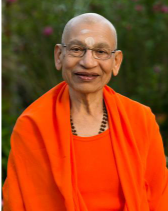
Spiritual Discourses: What do I expect of myself?
(In continuation of the last article)

By Swami Viditatmananda Saraswati*
By fulfilling my expectation of myself, what do I expect of myself? I expect that I should be a kind person. I expect of myself that I should be a loving person. I expect of myself that I should be a good person. I like a kind self, not an unkind self. I like a loving self, not a hating self. When they tell me, “Swamiji, please pose for a photograph.” How do I pose? Do I pose with a fierce look? No, with a smile, because I like the smiling self, not a hating self. I don’t like myself to be cruel. I don’t like myself when I am hating. I don’t like myself when I am dishonest. I like myself when I am honest. I don’t like myself when I am not truthful. I like myself when I am truthful. You may ask a question, “If you like yourself to be truthful, then why do you tell lies?”
Every human being wants to be honest and truthful. And still, we find people telling lies. Everybody wants to be a kind and loving person, and still, we find people are cruel, hateful. Why? Because I am helpless when I am hateful. It is my helplessness that makes me a hateful person, a cruel person, an untruthful person. It is not by my choice that I tell a lie. It is not by my choice that I hate somebody.
Also read: Spirituality: Who is a successful human being?
It is not by my choice that I hurt somebody. Something makes me do all that. Some of you may have known about “Mahābhārata”. There was a character whose name was Duryodhana. He was a very powerful king, but he always violated dharma, righteousness. Somebody asked him, “Hey, you are a learned person. You know what adharma, unrighteousness, is. You know what righteousness is. You know what truthfulness is. Then why do you act the opposite of that? Why do you violate the dharma?”
Duryodhana replied, “I know what dharma or righteousness is, but I cannot practice it. I know what adharma or unrighteousness is, but I cannot give it up. There is somebody within me that forces me to behave in this manner.” This means, within all of us, there is some devil or evil, which forces us to act against our values. Even though I want to be a loving person, I am compelled to be a hateful person. That is how I dislike myself.
So, how do I start liking myself? By deliberately being a kind person, a loving person. “But Swamiji, I am not kind, I am not loving. How can I act as a kind person?” Then Swamiji says, “Fake it until you make it!” Pretend as though you are a loving person, and ask yourself, “How would I conduct myself if I were a loving person?” And make yourself do that. That fellow inside says, “Hate him!” I assert myself, “No, I am going to love him.” How do you love a person? By helping him. By serving him. By being kind to that person. So, even though kindness is not natural, I deliberately make myself act as a good person, deliberately I try to become a good person.
There is one simple rule. Everyone knows that rule. Do not do unto others what you do not want them to do unto you. Reach out to others as you want them to treat you. We are all in agreement on how we want to be treated by others. We want others to be kind to us. We want others to be honest with us. We want others to be generous to us. We are all in agreement. I do not want to be hurt. I do not want to be insulted. I do not want someone to steal something that belongs to me. Is there anybody who doesn’t agree?
Our Pujya Swamiji would say to the audience, “Nobody wants to be hurt. Is there somebody who wants to be hurt?” Nobody would say yes to that. But once, our Swamiji was surprised. One fellow got up in the audience and said, “Yes!” Now Swamiji was confused because the rule is that nobody wants to be hurt. Here is an exception.
An exception breaks the rule. Swamiji did not know what to do. Fortunately, the audience came to his rescue. They said, “Swamiji!” and made a gesture meaning the fellow is mentally not right. This means that no normal person would want to be hurt. So there is a simple rule that says: “I should not do to others what I do not want them to do to me.” I should not hurt others. I should not insult others. I should not tell them lies. I should be kind to them. I should be helpful to them.
How would I do that? Fake it until you make it! In every situation, we can apply the simple rule. I place myself in the situation of the other person. And I ask myself, how would I like to be treated if I were in that situation? Then I will know how to treat that person. I know that even when I have done something wrong, I don’t want to be punished. I want to be pardoned. If somebody has done something wrong, should I punish that person? Or pardon that person?
What I would expect, is what I should try to do. It is not easy, because we have strong impulses of hurting, of retaliating, of punishing. We have to control those impulses by keeping them in check. Then only we can act as we want to act.
This is the first step in gaining success in life. It is to follow the basic values of life. Nonviolence is a value. Truthfulness is a value. Compassion is a value. Kindness is a value. These are natural values, meaning we are born with a love for them. These values should become valuable to us. We all know these values and still we compromise them. Because in life, other things are also valuable to us. Money is also valuable. Power is valuable. Fame is valuable. My job is valuable. My family is valuable. So these worldly things are also valuable. These are called acquired values. There are natural values and acquired values.
This non-violence and kindness are natural values. We are born with them. But as we grow up in society, we find that people value money, power and material achievements. We find that people are respected who gain the front page of the newspaper, the wealthy, the famous, and the powerful.
Therefore, we cultivate a value for these worldly achievements also.
So there are two sets of values. One set is the natural or universal values. The other set is the acquired values. There is a clash between the two. In order to speak the truth, I may have to sacrifice money. For example, many years ago, I was returning from the United States to India and was passing through customs at Bombay Airport with two huge suitcases. I knew that lots of electronic appliances were in those suitcases because you could not get them in India those days and so I brought them from the United States. But they would charge a lot of customs duty. When I passed by the customs officer he would ask me, “Swamiji, do you have something to declare?” He said “Swamiji” instead of “Swami” because in India the people still value the Swamis. If I had said, “No, I have nothing to declare”, he would let me go. I would save 100,000 rupees with one small untruth.
The moment the customs officer asks me, “Do you have something to declare?” there are two voices within me. One voice tells me, “You are a Swami giving classes on honesty, you are supposed to be honest.” The other voice, the greedy self tells me, “Hey, a hundred thousand rupees is a lot of money. You tell a small lie, how does it matter?” There is a conflict within myself. Who wins? Often the money wins and the truth loses. So this is where willpower is required. This is where the value of a value is required. Only when the value of honesty is more than the value of money, I can be honest. If the money is more important, my honesty is likely to be compromised.
That’s why in the world, we find violations of values. Greed makes people dishonest. Anger makes people cruel. Lust makes people use others as objects of sensuous pleasure. Käma, krodha, lobha. Käma means lust. Krodha means anger. Lobha means greed. These three are our inner enemies. We have to conquer them to be successful in life. I will share with you a simple story of how to deal with these three.
There is a story in the Upaniṣad where the teacher says to the disciples, one letter in Sanskrit, da. In English the equivalent is c. The c has three meanings: ” control over oneself”, “compassion” and “charity”. When kāma comes, when a strong desire comes, when one wants to indulge, for example when there is ice cream in front of me, I cannot control myself. Even though my doctor has told me there is too much sugar inside, “no more sugar for you!”, still the ice cream tempts me. I cannot control it. There is a tendency to indulge. This is kāma, so first ‘c’ for “control”: this much and no more! When I am seated for dinner, very delicious food is served. If I have no control at all, later I repent because I have acidity, stomach ache, and vomiting. Because while eating I have no control.
Therefore, before I start eating, I put boundaries: only one empanada, only one corn cake and no more! But they keep bringing more and more. Very delicious! One, two, again boundaries! One and no more! So, draw boundaries everywhere. That is how we control the tendency to indulge. Kāma can be controlled by putting boundaries: boundaries in talking, boundaries in watching TV, boundaries in WhatsApp, and the boundary in the cell phone. Everywhere, boundaries, boundaries, boundaries. That is the first ‘c’.
The second ‘c’ is compassion. When anger arises, when somebody has hurt me, I am angry at that person, I want to punish that person, I want to retaliate! I remind myself, ‘c’, compassion. Be compassionate to that person, be large-hearted. That person has done something wrong. Accommodate that person. Be kind to that person. So, ‘c’ is compassion. Remember ‘c’, ‘c’, ‘c’! The anger slowly subsides.
The third is greed. Greed means not being satisfied with what I have, and not parting with what I have. Even if I have plenty, I cannot part with it. This is greed. So third ‘c’ stands for charity: be charitable, be large-hearted, share what you have, and part with what you have. Our Pujya Swamiji used to say, “Give until it pinches you!” If you have one thousand pesos, giving five pesos is nothing. Out of one thousand pesos, give five hundred pesos. That is called “giving”. This is charity. You have to overcome this greed by charity. Overcome anger with compassion. Overcome indulgence by control. Thus, we move in the direction of victory over ourselves. As inner enemies become weaker and weaker, our goodness becomes more and more manifest. Because basically, we are good, kind, loving people. Each one of us is a good, kind, loving person.
As these enemies become weaker, the real person becomes manifest. You begin to like yourself, to be content with yourself. You are successful.
Success is not someday in future. Every time you win over the impulse of anger, you are successful. Every time you win over the impulse of kāma, you are successful. At every step, you are successful. So success is a process. It is not only the end, it is also the process. It leads you to total success. That is called “mokṣa”.
Vedanta says that the cessation of sorrow once and for all, is the same as the attainment of unsurpassable happiness because that is our nature. It is the sorrow that is denying us the experience of happiness that is our nature. The extent to which the sorrow goes away, to that extent our nature becomes evident. We become happy with ourselves. We become successful. That success leads us to mokṣa. All the best to all of you!
(Concluded)
*Swami Viditatmananda Saraswati has been teaching Vedānta Prasthānatrayī and Prakaraṇagranthas for the last 40 years in Ahmedabad, Gujarat. Throughout the year, he conducts daily Vedānta discourses, accompanied by retreats, and Jñāna Yajñas on Vedānta in different cities in India and in foreign countries.





